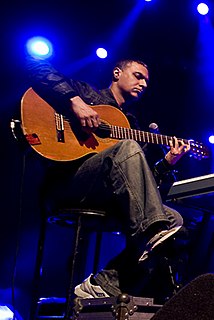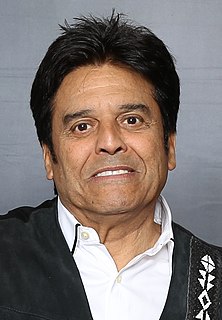A Quote by Nitin Sawhney
It's my language, the language I speak. I've spent a lot more time playing music than talking or writing.
Related Quotes
English has always been my musical language. When I started writing songs when I was 13 or 14, I started writing in English because it's the language in between. I speak Finnish, I speak French, so I'll write songs in English because that's the music I listen to. I learned so much poetry and the poetic way of expressing myself is in English.
The politics of language and the politics of writing really got to me. I've heard this phrase more than once now: this idea of the poetry wars, or the idea that people within the space of writing are at odds with one another or manipulating language to further one's political stance, manipulating language in ways that really felt dirty to me. All of these things worked their way into and through language for me.
Music is a universal language insofar as you don't need to know anything else about a musician that you are playing with other than that they can play music. It doesn't matter what their music is, you can find something that you can play together, with what their culture is. The dialect part of it comes into play, but nothing like the differentiation that language sets up, for example.
I mean, what's thematic? How to put it? Going back to, like, 1980, when I started writing poetry. Language itself became an issue. I'd even think about font as an aspect of text, you know, how something looks on a page. A lot of this is the product of a very solitary existence, it's like, language, I mean, you know. A lot of time spent alone in the creation of all of this stuff.
Then I speak to her in a language she has never heard, I speak to her in Spanish, in the tongue of the long, crepuscular verses of Díaz Casanueva; in that language in which Joaquín Edwards preaches nationalism. My discourse is profound; I speak with eloquence and seduction; my words, more than from me, issue from the warm nights, from the many solitary nights on the Red Sea, and when the tiny dancer puts her arm around my neck, I understand that she understands. Magnificent language!
A language possesses utility only insofar as it can construct conventional boundaries. A language of no boundaries is no language at all, and thus the mystic who tries to speak logically and formally of unity consciousness is doomed to sound very paradoxical or contradictory. The problem is that the structure of any language cannot grasp the nature of unity consciousness, any more than a fork could grasp the ocean.
This happens to a lot of kids from different backgrounds - they lose a lot of their parents' and grandparents' teachings, language and culture because they have to deal with another language and culture 24/7. By the time I was 44, I was terrible at Spanish. I was always intimidated whenever I had to speak it.




































